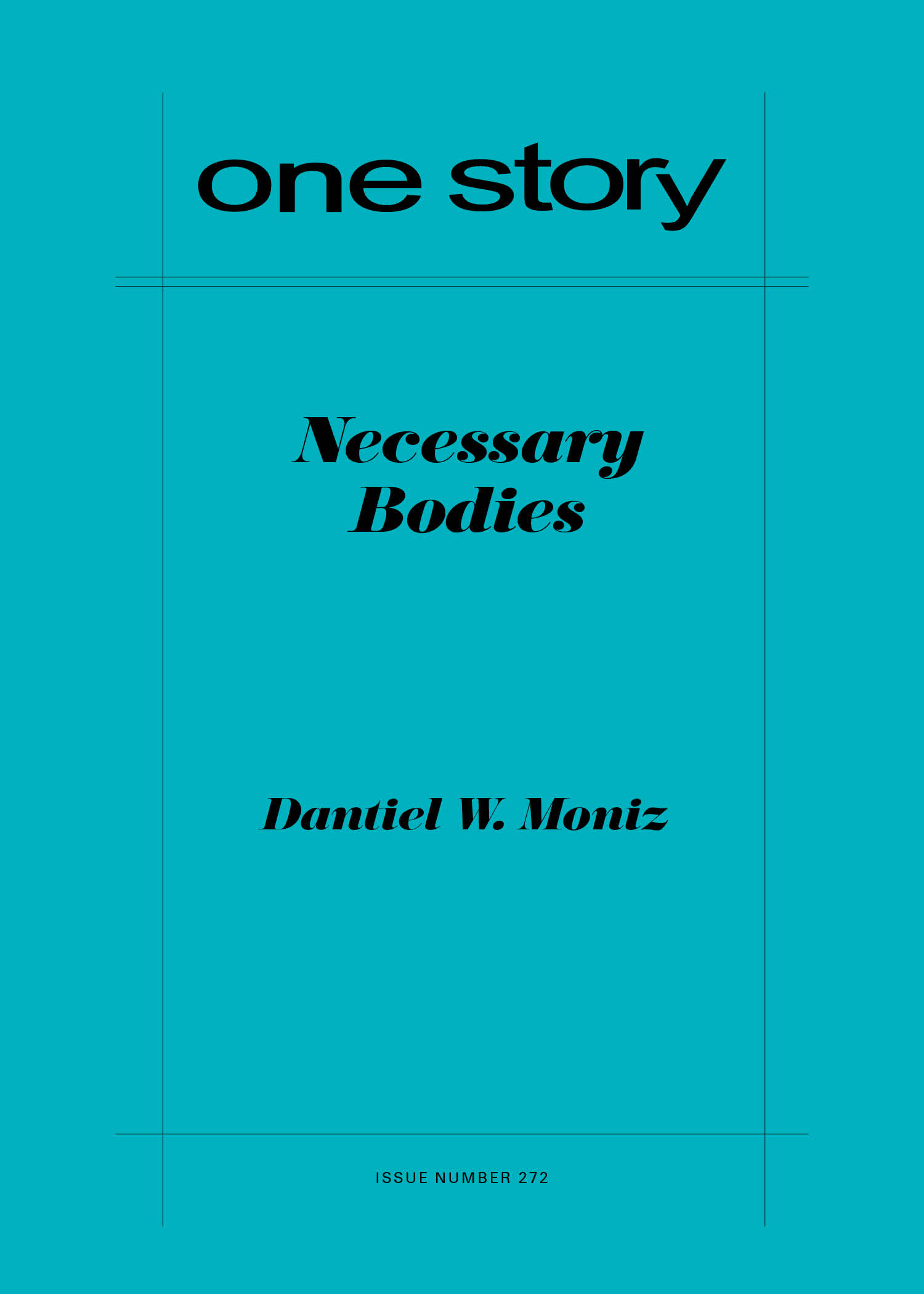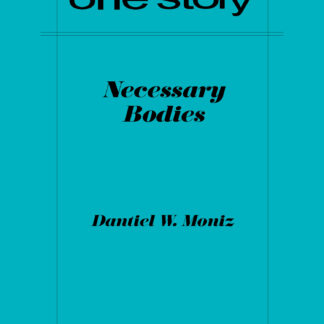
Necessary Bodies
$2.50
98 in stock
Excerpt
Management didn’t remove the glass bottles, burger wrappers, used condoms, or cigarette butts—they just dyed the water blue, a kind of golf-course aquamarine Billie had to squint and step closer to make sure of as it frothed from the fountain that ran from nine to nine. Even standing there a few minutes, she couldn’t tell if the hue was only a trick of light. The women in the front office were dreadful, a sneering bunch who had lost their charm as soon as she and Liam signed the lease, so she stopped the first maintenance guy she saw as she crossed the parking lot, one with whom she was on nodding terms. It was an easy relationship that required no names. She said, “Did y’all color the pond?”
“Looks good, right?” he said cheerfully, his white-white teeth flashing in the sun as he hauled cardboard boxes into the back of his utility vehicle. “You can’t even tell it’s not real.”
“Mmm,” Billie said, inclining her car keys towards him. About as real as those veneers, she wanted to say. Everyone knew Jacksonville water to be mostly brown. Moss swayed lightly from the oaks, suggesting breeze, but if there was one, it was a dead wind and even the sidewalk seemed to sweat. A heron ducked its gray head under the ripples, plucking something up and swallowing it—a small fish or maybe a piece of plastic, confused by its glint.
Dantiel W. Moniz
Dantiel W. Moniz is the recipient of the Alice Hoffman Prize for Fiction, the Cecelia Joyce Johnson Emerging Writer Award by the Key West Literary Seminar, and a Tin House Scholarship. Her fiction has appeared or is forthcoming in The Paris Review, Tin House, American Short Fiction, The Yale Review, McSweeney’s Quarterly Concern, and elsewhere. Her debut collection, Milk Blood Heat, arrives February 2021.
Patrick Ryan on “Necessary Bodies”
Billie, the main character in Dantiel W. Moniz’s story “Necessary Bodies,” has a secret: she’s pregnant. This is primarily a secret she’s keeping from her mother, Colette, who’s about to turn fifty, has two grown children, and—so far—no grandchildren. To Colette’s thinking, if one can make babies, one should make babies.
But to Billie’s thinking, a prospective parent should ask herself some very important questions before bringing a child into the world, one of which is, Will I be a good parent?
That alone makes “Necessary Bodies” a bold and challenging story, because while most everyone hopes they would rise to the occasion of child-rearing if presented with it, not everyone does. (If everyone did, think of all the great novels sprung from unhappy childhoods we’d be deprived of.) Dantiel W. Moniz says in our Q&A that she’s a writer who doesn’t shy away from uncomfortable or undesirable feelings, and the result of that is writing that feels refreshingly—and comfortably—real. This story, our last in a very rocky and challenging year, is a pre-pandemic joy to read. I’m delighted to introduce you to it and to this dynamic, emerging author.
Q&A by Patrick Ryan
- PR: Where did the idea for this story come from?
- DM: This idea came around a time when my husband and I had been married for about three years and all anyone would ask was, “When are y’all finally having babies?” like it was the one thing we were made for—and I guess plenty of people do feel that way. At that time in my life, I was trying to separate what I actually wanted versus what I’d been conditioned to want. I don’t think it’s always socially acceptable to have doubts or questions around parenthood, but a story can feel like a safe place to explore possibilities.
- PR: What was the most challenging aspect of writing this story?
- DM: Figuring out how to tell this story without it feeling too familiar, and after that, getting the shape of it right. I like cyclical stories, little calls and responses throughout the text, but it isn’t always readily apparent how to make that happen without it being too obvious.
- PR: Were there any surprises during the writing? Another way I sometimes ask this question is, how different is the finished story from the one you originally set out to write?
- DM: The pond surprised me. Two real-life instances happened with the pond before I realized it connected to the story—first, being outside on a night I couldn’t sleep, around 3 a.m., and watching what the minnows did to the surface of the water; and second, my apartment complex really did dye our retention pond. And after I had those two images, the diversion between Billie’s desires and Collette’s made so much sense and everything else fell into place. I don’t know if I would have ever written this story without it.
- PR: Colette is one of my favorite characters in recent memory. She shines in this story and comes across as an entirely genuine person. Is she based on anyone you know? Or is she a composite of multiple sources?
- DM: Collette is definitely part life, part figment—and I’ve known a lot of mothers like her. Usually, if I’m drawing from my own life or the world, I use the starting inspiration as a jumping off point to get to deeper truths I’m interested in.
- PR: There’s a gripping and funny passage in the story where Billie runs through a string of what-ifs as she contemplates bringing a child into the world. Every one of her worries rings true. Did that list come easily for you? Was there anything you considered including that you took out?
- DM: This list came too easily, if I’m being honest. Humans have a way of showcasing our worst qualities (I believe mostly out of love or fear rather than outright evil) and I’m always aware that each day could be my last—though I try not to let that knowledge dictate my life. As far as leaving anything out, with this list, as with my fiction in general, I try not to censor myself, especially with uncomfortable or undesirable feelings. I ask myself: Is this too much? and then counter that with: Well, if I’m wondering it/thinking it, probably someone else is too.
- PR: Without giving too much away, do you think by the end of the story Billie has, without a doubt, made up her mind about what to do next (in relation to the matter she’s been contemplating throughout the story)
- DM: I 100% believe she’s made her decision and in those last few sentences is moving into acceptance of that choice.
- PR: How long did it take you to complete this story?
- DM: I see in my notes app that the first idea I ever had for this story occurred March 2016, but I didn’t attempt a first draft until September 2018. For most stories, I can produce a draft within a few days, but I think they all have an essential incubation period in my head before I can ever sit down to write them, and the time between each draft varies depending on how long it takes for me to understand what a particular story needs from me. When it’s all said and done, this one took about three years to reach a final draft.
- PR: Finish this sentence in just one word—the word you think best captures it: “This story is about __________.”
- DM: Love.
- PR: What are you working on now?
- DM: I’m working on a novel, which is actually my first book, but has been way more stubborn than the story collection. Pray for me.
- PR: What is the best bit of advice about writing you have ever received?
- DM: Multiple brilliant writers and teachers have said this and I always come back to it: “Write for yourself first.” Don’t chase trends, don’t shrink from whatever it is that’s calling to be explored on the page. Even if it’s uncomfortable or if you don’t yet know what you’re trying to say. I think, if we stay engaged with the part of ourselves that has asked for the story, with work, belief, and patience, the intent comes through in the end.
